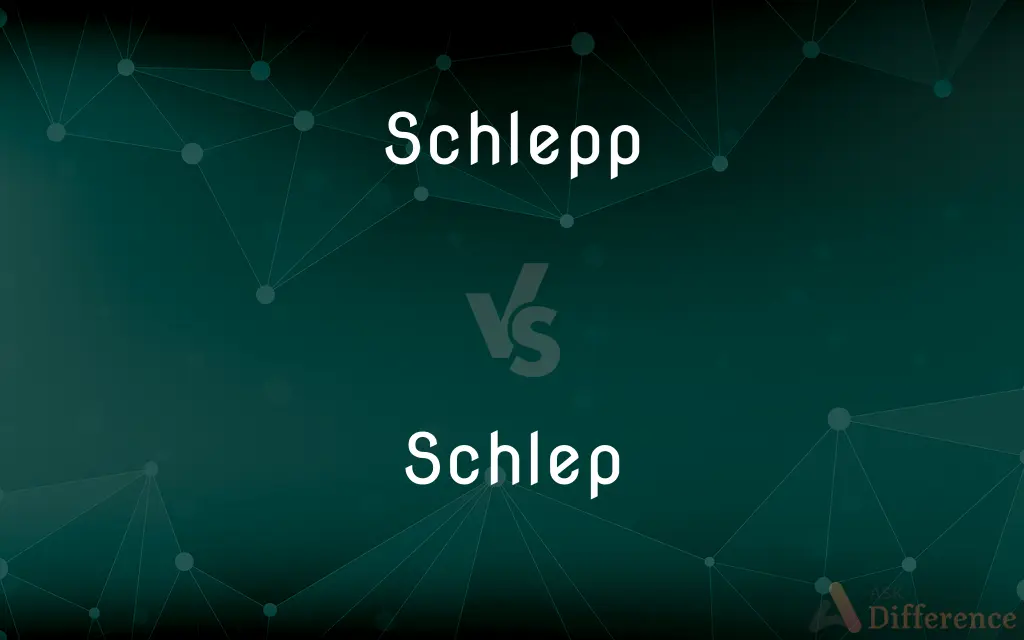Schlepp vs. Schlep — What's the Difference?
By Fiza Rafique & Urooj Arif — Updated on April 24, 2024
"Schlepp" and "schlep" denote the act of carrying or dragging something heavy, but "schlep" is the more commonly used spelling in American English.

Difference Between Schlepp and Schlep
Table of Contents
ADVERTISEMENT
Key Differences
Schlepp is an alternative spelling that carries the same meaning but is less commonly used and may appear in more dialect-specific instances. Whereas schlep is often used to describe the laborious task of carrying or dragging something cumbersome or unwieldy, particularly in a casual or colloquial context.
Schlep can also convey the sense of making a tedious or difficult journey. On the other hand, schlepp is used similarly but might be less recognized, potentially causing confusion or appearing as a spelling error in general discourse.
Schlep is well-integrated into American English, used both as a noun and a verb. While schlepp also functions in both grammatical roles, its usage is more often seen in written forms that embrace a variety of English dialects or seek a phonetic emphasis.
Schlep has a straightforward pronunciation [shlep], aligning with its Yiddish roots and easy assimilation into English. Whereas schlepp might lead to pronunciation variations, reflecting its less standardized spelling.
Schlep appears frequently in American media and conversation, highlighting its acceptance and familiarity among speakers. Schlepp, however, may appear in more culturally specific contexts or literary works aiming to capture a unique voice or setting.
ADVERTISEMENT
Comparison Chart
Common Usage
Less commonly used
Commonly used
Spelling Variations
Alternative spelling
Standard spelling
Function in Grammar
Same as Schlep
Used as both noun and verb
Pronunciation
Same, but may vary
[shlep]
Cultural Connotation
More niche or dialect-specific
Broadly recognized
Compare with Definitions
Schlepp
To move with difficulty.
They schlepped their luggage across the crowded airport.
Schlep
To move slowly or laboriously.
He schlepped around the house all day.
Schlepp
A long or tiresome journey.
Going to that distant mall is such a schlepp.
Schlep
A tedious or long journey.
It's quite a schlep from here to the downtown office.
Schlepp
A burdensome task.
Preparing for the annual sale is always a schlepp.
Schlep
To haul or carry something heavy.
I had to schlep my groceries up three flights of stairs.
Schlepp
A drag; something laborious.
The walk back to the car was a real schlepp.
Schlep
Used informally to describe going somewhere reluctantly.
I guess I’ll schlep over to the meeting.
Schlepp
To drag or carry clumsily.
We had to schlepp the old couch to the curb.
Schlep
An annoyingly strenuous task.
Organizing the garage was a real schlep.
Schlepp
To carry clumsily or with difficulty; lug
Schlepped a shopping bag around town.
Schlep
To carry clumsily or with difficulty; lug
Schlepped a shopping bag around town.
Schlepp
To move slowly or laboriously
Schlepped around with the twins in a stroller.
Schlep
To move slowly or laboriously
Schlepped around with the twins in a stroller.
Schlepp
An arduous journey.
Schlep
An arduous journey.
Schlepp
A clumsy or stupid person.
Schlep
A clumsy or stupid person.
Schlepp
Alternative form of schlep
Schlep
To carry, drag, or lug.
I'm exhausted after schlepping those packages around all day.
Schlepp
Alternative form of schlep
Schlep
To go, as on an errand; to carry out a task.
I schlepped down to the store for some milk.
Schlep
To act in a slovenly, lazy, or sloppy manner.
I just schlepped around the house on Sunday.
Schlep
(informal) A long or burdensome journey.
Sure you can go across town to get that, but it'd be a schlep.
Schlep
(informal) A boring person, a drag; a good-for-nothing person.
Schlep
(informal) A sloppy or slovenly person.
Schlep
(informal) A “pull” or influence.
He must have had a lot of schlep to get such good seats.
Schlep
Pull along heavily, like a heavy load against a resistance;
Can you shlep this bag of potatoes upstairs?
She pulled along a large trunk
Common Curiosities
Can "schlep" be used in formal writing?
It's generally informal; use sparingly in formal contexts.
Is "schlep" only used for physical tasks?
No, "schlep" can refer to any laborious journey or task, physical or metaphorical.
Does "schlep" have a positive or negative connotation?
It typically has a negative or neutral connotation, implying effort or inconvenience.
How is "schlep" used in a sentence as a verb?
Example: "I don't want to schlep all the way across town."
Are "schlep" and "schlepp" interchangeable in usage?
Yes, they can be used interchangeably, but "schlep" is more standard.
What part of speech is "schlep" when used to describe difficulty?
It functions as a noun.
Can "schlep" be used humorously?
Yes, it's often used humorously to describe over-exertions.
Is "schlepp" recognized in all English dictionaries?
Some dictionaries may not list "schlepp" as it's less common.
Is "schlep" a slang?
It's considered colloquial rather than slang.
What is the origin of "schlep"?
It originates from Yiddish, where it means to drag or haul.
How is "schlep" used as a noun?
Example: "That store is a schlep from here."
Can "schlepp" appear in academic texts?
It’s rare and better suited to informal contexts.
How has the usage of "schlep" evolved in English?
It has become a common term for describing any cumbersome task or journey.
Are there synonyms for "schlep"?
Yes, synonyms include haul, drag, lug.
Is there a preferred context for using "schlepp"?
It might be preferred in creative writing or for phonetic impact.
Share Your Discovery

Previous Comparison
Intonation vs. Inflection
Next Comparison
Stunod vs. StunadAuthor Spotlight
Written by
Fiza RafiqueFiza Rafique is a skilled content writer at AskDifference.com, where she meticulously refines and enhances written pieces. Drawing from her vast editorial expertise, Fiza ensures clarity, accuracy, and precision in every article. Passionate about language, she continually seeks to elevate the quality of content for readers worldwide.
Co-written by
Urooj ArifUrooj is a skilled content writer at Ask Difference, known for her exceptional ability to simplify complex topics into engaging and informative content. With a passion for research and a flair for clear, concise writing, she consistently delivers articles that resonate with our diverse audience.














































